- Home
- Harry Harrison
Planet of the Damned Page 7
Planet of the Damned Read online
Page 7
VII
With the cool air and firmly packed sand under foot, walking shouldhave been easy. Lea spoiled that. The concussion seemed to havetemporarily cut off the reasoning part of her brain, leaving adirect connection to her vocal cords. As she stumbled along, onlyhalf conscious, she mumbled all of her darkest fears that werebetter left unvoiced. Occasionally there was relevancy in hercomplaints. They would lose their way, never find the city, die ofthirst, freezing, heat or hunger. Interspersed and entwined withthese were fears from her past that still floated, submerged in thetimeless ocean of her subconscious. Some Brion could understand,though he tried not to listen. Fears of losing credits, not gettingthe highest grade, falling behind, a woman alone in a world of men,leaving school, being lost, trampled among the nameless hordes thatstruggled for survival in the crowded city-states of Earth.
There were other things she was afraid of that made no sense to aman of Anvhar. Who were the alkians that seemed to trouble her? Orwhat was canceri? Daydle and haydle? Who was Manstan, whose namekept coming up, over and over, each time accompanied by a littlemoan?
Brion stopped and picked her up in both arms. With a sigh shesettled against the hard width of his chest and was instantlyasleep. Even with the additional weight he made better time now, andhe stretched to his fastest, kilometre-consuming stride to make gooduse of these best hours.
Somewhere on a stretch of gravel and shelving rock he lost the trackof the sand car. He wasted no time looking for it. By carefullywatching the glistening stars rise and set he had made a goodestimate of the geographic north. Dis didn't seem to have a polestar; however, a boxlike constellation turned slowly around theinvisible point of the pole. Keeping this positioned in line withhis right shoulder guided him on the westerly course he needed.
When his arms began to grow tired he lowered Lea gently to theground; she didn't wake. Stretching for an instant, before taking uphis burden again, Brion was struck by the terrible loneliness of thedesert. His breath made a vanishing mist against the stars; all elsewas darkness and silence. How distant he was from his home, hispeople, his planet! Even the constellations of the night sky weredifferent. He was used to solitude, but this was a loneliness thattouched some deep-buried instinct. A shiver that wasn't from thedesert cold touched lightly along his spine, prickling at the hairson his neck.
It was time to go on. He shrugged the disquieting sensations off andcarefully tied Lea into the jacket he had been wearing. Slung like apack on his back, it made the walking easier. The gravel gave way tosliding dunes of sand that seemed to continue to infinity. It was apainful, slipping climb to the top of each one, then an equallydifficult descent to the black-pooled hollow at the foot of thenext.
With the first lightening of the sky in the east he stopped, breathrasping in his chest, to mark his direction before the stars faded.One line scratched in the sand pointed due north, a second pointedout the course they should follow. When they were aligned to hissatisfaction he washed his mouth out with a single swallow of waterand sat on the sand next to the still form of the girl.
Gold fingers of fire searched across the sky, wiping out the stars.It was magnificent; Brion forgot his fatigue in appreciation. Thereshould be some way of preserving it. A quatrain would be best. Shortenough to be remembered, yet requiring attention and skill tocompact everything into it. He had scored high with his quatrains inthe Twenties. This would be a special one. Taind, his poetry mentor,would have to get a copy.
"What are you mumbling about?" Lea asked, looking up at the craggyblackness of his profile against the reddening sky.
"Poem," he said. "Shhh. Just a minute."
It was too much for Lea, coming after the tension and dangers of thenight. She began to laugh, laughing even harder when he scowled ather. Only when she heard the tinge of growing hysteria did she makean attempt to break off the laughter. The sun cleared the horizon,washing a sudden warmth over them. Lea gasped.
"Your throat's been cut! You're bleeding to death!"
"Not really," he said, touching his fingertips lightly against theblood-clotted wound that circled his neck. "Just superficial."
Depression sat on him as he suddenly remembered the battle and deathof the previous night. Lea didn't notice his face; she was busydigging in the pack he had thrown down. He had to use his fingers tomassage and force away the grimace of pain that twisted his mouth.Memory was more painful than the wound. How easily he had killed!Three men. How close to the surface of the civilized man the animaldwelled! In countless matches he had used those holds, alwaysdrawing back from the exertion of the full killing power. They werepart of a game, part of the Twenties. Yet when his friend had beenkilled he had become a killer himself. He believed in nonviolenceand the sanctity of life--until the first test, when he had killedwithout hesitation. More ironic was the fact he really felt noguilt, even now. Shock at the change, yes. But no more than that.
"Lift your chin," Lea said, brandishing the antiseptic applicatorshe had found in the medicine kit. He lifted his chin obligingly andthe liquid drew a cool, burning line across his neck. Antibio pillswould do a lot more good, since the wound was completely clotted bynow, but he didn't speak his thoughts aloud. For the moment Lea hadforgotten herself in taking care of him. He put some of theantiseptic on her scalp bruise and she squeaked, pulling back.They both swallowed the pills.
"That sun is hot already," Lea said, peeling off her heavyclothing. "Let's find a nice cool cave or an air-cooled saloonto crawl into for the day."
"I don't think there are any here. Just sand. We have to walk--"
"I know we have to walk," she interrupted. "There's no need for alecture about it. You're as seriously cubical as the Bank of Terra.Relax. Count ten and start again." Lea was making empty talk whileshe listened to the memory of hysteria tittering at the fringes ofher brain.
"No time for that. We have to keep going." Brion climbed slowly tohis feet after stowing everything in the pack. When he sighted alonghis marker at the western horizon he saw nothing to mark theircourse, only the marching dunes. He helped Lea to her feet and beganwalking slowly towards them.
"Just hold on a second," Lea called after him. "Where do you thinkyou're going?"
"In that direction," he said, pointing. "I hoped there would besome landmarks, but there aren't. We'll have to keep on by deadreckoning. The sun will keep us pretty well on course. If we aren'tthere by night the stars will be a better guide."
"All this on an empty stomach? How about breakfast? I'm hungry--andthirsty."
"No food." He shook the canteen that gurgled emptily. It had beenonly partly filled when he found it. "The water's low and we'll needit later."
"I need it now," she said shortly. "My mouth tastes like anunemptied ashtray and I'm dry as paper."
"Just a single swallow," he said after the briefest hesitation."This is all we have."
Lea sipped at it with her eyes closed in appreciation. Then hesealed the top and returned it to the pack without taking anyhimself. They were sweating as they started up the first dune.
The desert was barren of life; they were the only things movingunder that merciless sun. Their shadows pointed the way ahead ofthem, and as the shadows shortened the heat rose. It had anintensity Lea had never experienced before, a physical weight thatpushed at her with a searing hand. Her clothing was sodden withperspiration, and it trickled burning into her eyes. The light andheat made it hard to see, and she leaned on the immovable strengthof Brion's arm. He walked on steadily, apparently ignoring the heatand discomfort.
"I wonder if those things are edible--or store water?" Brion's voicewas a harsh rasp. Lea blinked and squinted at the leathery shape onthe summit of the dune. Plant or animal, it was hard to tell. It wasthe size of a man's head, wrinkled and grey as dried-out leather,knobbed with thick spikes. Brion pushed it up with his toe and theyhad a brief glimpse of a white roundness, like a shiny taproot,going down into the dune. Then the thing contracted, pulling itselflower into the sand. At the same instant some
thing thin and sharplashed out through a fold in the skin, striking at Brion's boot andwithdrawing. There was a scratch on the hard plastic, beaded withdrops of green liquid.
"Probably poison," he said, digging his toe into the sand. "Thisthing is too mean to fool with--without a good reason. Let's keepgoing."
It was before noon when Lea fell down. She really wanted to go on,but her body wouldn't obey. The thin soles of her shoes were noprotection against the burning sand and her feet were lumps of rawpain. Heat hammered down, poured up from the sand and swirled her inan oven of pain. The air she gasped in was molten metal that driedand cracked her mouth. Each pulse of her heart throbbed blood to thewound in her scalp until it seemed her skull would burst with theagony. She had stripped down to the short tunic--in spite of Brion'sinsistence that she keep her body protected from the sun--and thatclung to her, soaked with sweat. She tore at it in a desperateeffort to breathe. There was no escape from the unending heat.
Though the baked sand burned torture into her knees and hands,she couldn't rise. It took all her strength not to fall further.Her eyes closed and everything swirled in immense circles.
Brion, blinking through slitted eyes, saw her go down. He liftedher, and carried her again as he had the night before. The hot touchof her body shocked his bare arms. Her skin was flushed pink. Thetunic was torn open and one pointed breast rose and fell unevenlywith the irregularity of her breathing. Wiping his palm free ofsweat and sand, he touched her skin and felt the ominous hotdryness.
Heat-shock, all the symptoms. Dry, flushed skin, the raggedbreathing. Her temperature rising quickly as her body stoppedfighting the heat and succumbed.
There was nothing he could do here to protect her from the heat. Hemeasured a tiny portion of the remaining water into her mouth andshe swallowed convulsively. Her thin clothing was little protectionfrom the sun. He could only take her in his arms and keep on towardsthe horizon. An outcropping of rock threw a tiny patch of shade andhe walked towards it.
The ground here, shielded from the direct rays of the sun, feltalmost cool by contrast. Lea opened her eyes when he put her down,peering up at him through a haze of pain. She wanted to apologize tohim for her weakness, but no words came from the dried membrane ofher throat. His body above her seemed to swim back and forth in theheat waves, swaying like a tree in a high wind.
Shock drove her eyes open, cleared her mind for an instant. Hereally was swaying. Suddenly she realized how much she had come todepend on the unending solidity of his strength--and now it wasfailing. All over his body the corded muscles contracted in ridges,striving to keep him erect. She saw his mouth pulled open by thetaut cords of his neck, and the gaping, silent scream was moreterrible than any sound. Then she herself screamed as his eyesrolled back, leaving only the empty white of the eyeballs staringterribly at her. He went over, back, down, like a felled tree,thudding heavily on the sand. Unconscious or dead, she couldn'ttell. She pulled limply at his leg, but couldn't drag his immenseweight into the shade.
Brion lay on his back in the sun, sweating. Lea saw this and knewthat he was still alive. Yet what was happening? She groped formemory in the red haze of her mind, but could remember nothing fromher medical studies that would explain this. On every square inch ofhis body the sweat glands seethed with sudden activity. From everypore oozed great globules of oily liquid, far thicker than normalperspiration. Brion's arms rippled with motion and Lea gaped,horrified as the hairs there writhed and stirred as though endowedwith separate life. His chest rose and fell rapidly, deep, gaspingbreaths racking his body. Lea could only stare through the dimredness of unreality and wonder if she was going mad before shedied.
A coughing fit broke the rhythm of his rasping breath, and when itwas over his breathing was easier. The perspiration still coveredhis body, the individual beads touching and forming tiny streamsthat trickled down his body and vanished in the sand. He stirred androlled onto his side, facing her. His eyes were open and normal nowas he smiled.
"Didn't mean to frighten you. It caught me suddenly coming at thewrong season and everything. It was a bit of a jar to my system.I'll get you some water now--there's still a bit left."
"What happened? When you looked like that, when you fell...."
"Take two swallows, no more," he said, holding the open canteen toher mouth. "Just summer change, that's all. It happens to us everyyear on Anvhar--only not that violently, of course. In the winterour bodies store a layer of fat under the skin for insulation, andsweating almost ceases completely. There are a lot of internalchanges too. When the weather warms up the process is reversed. Thefat is metabolized and the sweat glands enlarge and begin workingovertime as the body prepares for two months of hard work, heat andlittle sleep. I guess the heat here triggered off the summer changeearly."
"You mean--you've adapted to this terrible planet?"
"Just about. Though it does feel a little warm. I'll need a lotmore water soon, so we can't remain here. Do you think you can standthe sun if I carry you?"
"No, but I won't feel any better staying here." She waslight-headed, scarcely aware of what she said. "Keep going, I guess.Keep going."
As soon as she was out of the shadow of the rock the sunlight burstover her again in a wave of hot pain. She fell unconscious at once.Brion picked her up and staggered forward. After a few yards, hebegan to feel the pull of the sand. He knew he was reaching the endof his strength. He went more slowly and each dune seemed a bithigher than the one before. Giant, sand-scoured rocks pushed throughthe dunes here and he had to stumble around them. At the base ofthe largest of these monoliths was a straggling clump of knottedvegetation. He passed it by--then stopped as something tried topenetrate his heat-crazed mind. What was it? A difference. Somethingabout these plants that he hadn't noticed in any of the othershe had passed during the day.
It was almost like defeat to turn and push his clumsy feet backwardsin his own footprints; to stand blinking helplessly at the plants.Yet they were important. Some of them had been cut off close to thesand. Not broken by any natural cause, but cut sharply and squarelyby a knife or blade of some sort. The cut plants were long dried anddead, but a tiny hope flared up in him. This was the first sign thatother people were actually alive on this heat-blasted planet. Andwhatever the plants had been cut for, they might be of aid to him.Food--perhaps drink. His hands trembled at the thought as he droppedLea heavily into the shade of the rock. She didn't stir.
His knife was sharp, but most of the strength was gone from hishands. Breath rasping in his dried throat, he sawed at the toughstem, finally cutting it through. Raising up the shrub, he sawa thick liquid dripping from the severed end. He braced his handagainst his leg, so it wouldn't shake and spill, until his cuppedpalm was full of sap.
It was wet, even a little cool as it evaporated. Surely it wasmostly life-giving water. He had a moment's misgiving as he raisedit to his lips, and instead of drinking it merely touched it withthe tip of his tongue.
At first nothing--then a searing pain. It stabbed deep into histhroat and choked him. His stomach heaved and he vomited bitterbile. On his knees, fighting the waves of pain, he lost body fluidhe vitally needed.
Despair was worse than the pain. The plant juice must have some use;there must be a way of purifying it or neutralizing it. But Brion,a stranger on this planet, would be dead long before he found outhow to do this.
Weakened by the cramps that still tore at him, he tried not torealize how close to the end he was. Getting the girl on his backseemed an impossible task, and for an instant he was tempted toleave her there. Yet even as he considered this he shouldered herleaden weight and once more went on. Each footstep an effort, hefollowed his own track up the dune. Painfully he forced his wayto the top, and looked at the Disan standing a few feet away.
They were both too surprised by the sudden encounter to react atonce. For a breath of time they stared at each other, unmoving. Whenthey reacted it was the same defense of fear. Brion dropped thegirl, bringing the gun up from the holste
r in the return of the samemotion. The Disan jerked a belled tube from his waistband and raisedit to his mouth.
Brion didn't fire. A dead man had taught him how to train hisempathetic sense, and to trust it. In spite of the fear that wantedhim to jerk the trigger, a different sense read the unvoicedemotions of the native Disan. There was fear there, and hatred.Welling up around these was a strong desire not to commit violence,this time, to communicate instead. Brion felt and recognized allthis in a fraction of a second. He had to act instantly to avoid atragic happening. A jerk of his wrist threw the gun to one side.
As soon as it was gone he regretted its loss. He was gambling theirlives on an ability he still was not sure of. The Disan had thetube to his mouth when the gun hit the ground. He held the pose,unmoving, thinking. Then he accepted Brion's action and thrust thetube back into his waistband.
"Do you have any water?" Brion asked, the guttural Disan wordshurting his throat.
"I have water," the man said. He still didn't move. "Who are you?What are you doing here?"
"We're from offplanet. We had ... an accident. We want to goto the city. The water."
The Disan looked at the unconscious girl and made his decision. Overone shoulder he wore one of the green objects that Brion rememberedfrom the solido. He pulled it off and the thing writhed slowly inhis hands. It was alive--a green length a metre long, like a noduledsection of a thick vine. One end flared out into a petal-likeformation. The Disan took a hook-shaped object from his waist andthrust it into the petaled orifice. When he turned the hook in aquick motion the length of green writhed and curled around his arm.He pulled something small and dark out and threw it to the ground,extending the twisting green shape towards Brion. "Put your mouth tothe end and drink," he said.
Lea needed the water more, but he drank first, suspicious of theliving water source. A hollow below the writhing petals was fillingwith straw-colored water from the fibrous, reedy interior. He raisedit to his mouth and drank. The water was hot and tasted swampy.Sudden sharp pains around his mouth made him jerk the thing away.Tiny glistening white barbs projected from the petals pink-tippednow with his blood. Brion swung towards the Disan angrily--andstopped when he looked at the other man's face. His mouth wassurrounded by many small white scars.
"The _vaede_ does not like to give up its water, but it alwaysdoes," the man said.
Brion drank again, then put the vaede to Lea's mouth. She moanedwithout regaining consciousness, her lips seeking reflexively forthe life-saving liquid. When she was satisfied Brion gently drew thebarbs from her flesh and drank again. The Disan hunkered down onhis heels and watched them expressionlessly. Brion handed back thevaede, then held some of the clothes so that Lea was in their shade.He settled to the same position as the native and looked closelyat him.
Squatting immobile on his heels, the Disan appeared perfectlycomfortable under the flaming sun. There was no trace ofperspiration on his naked, browned skin. Long hair fell to hisshoulders, and startlingly blue eyes stared back at Brion fromdeepset sockets. The heavy kilt around his loins was the onlygarment he wore. Once more the vaede rested over his shoulder, stillstirring unhappily. Around his waist was the same collection ofleather, stone and brass objects that had been in the solido. Two ofthem now had meaning to Brion: the tube-and-mouthpiece, a blowgun ofsome kind; and the specially shaped hook for opening the vaede. Hewondered if the other strangely formed things had equally practicalfunctions. If you accepted them as artifacts with a purpose--notbarbaric decorations--you had to accept their owner as somethingmore than the crude savage he resembled.
"My name is Brion. And you--"
"You may not have my name. Why are you here? To kill my people?"
Brion forced away the memory of last night. Killing was just what hehad done. Some expectancy in the man's manner, some sensed feelingof hope prompted Brion to speak the truth.
"I'm here to stop your people from being killed. I believe in theend of the war."
"Prove it."
"Take me to the Cultural Relationships Foundations in the city andI'll prove it. I can do nothing here in the desert. Except die."
For the first time there was emotion on the Disan's face. He frownedand muttered something to himself. There was a fine beading of sweatabove his eyebrows now as he fought an internal battle. Coming to adecision, he rose, and Brion stood too.
"Come with me. I'll take you to Hovedstad. But first you will tellme--are you from Nyjord?"
"No."
The nameless Disan merely grunted and turned away. Brion shoulderedLea's unconscious body and followed him. They walked for two hours,the Disan setting a cruel pace, before they reached a wasteland ofjumbled rock. The native pointed to the highest tower of sand-erodedstone. "Wait near this," he said. "Someone will come for you." Hewatched while Brion placed the girl's still body in the shade, andpassed over the vaede for the last time. Just before leaving heturned back, hesitating.
"My name is ... Ulv," he said. Then he was gone.
Brion did what he could to make Lea comfortable, but it was verylittle. If she didn't get medical attention soon she would be dead.Dehydration and shock were uniting to destroy her.
Just before sunset he heard clanking, and the throbbing whine ofa sand car's engine coming from the west.

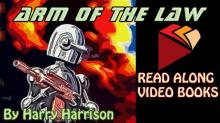 Arm of the Law
Arm of the Law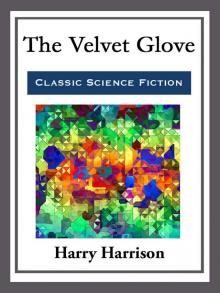 The Velvet Glove
The Velvet Glove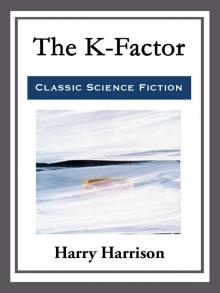 The K-Factor
The K-Factor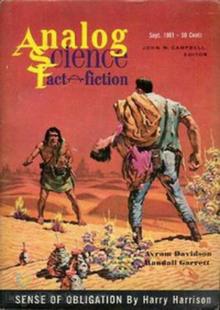 Sense of Obligation
Sense of Obligation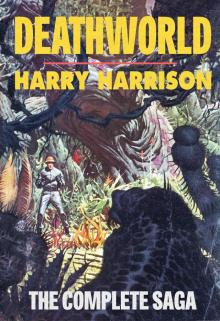 Deathworld: The Complete Saga
Deathworld: The Complete Saga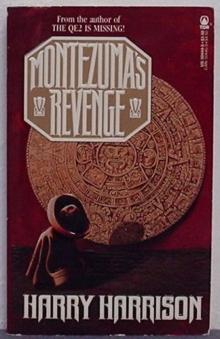 Montezuma's Revenge
Montezuma's Revenge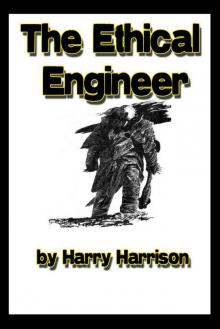 The Ethical Engineer
The Ethical Engineer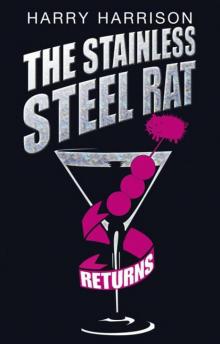 The Stainless Steel Rat Returns
The Stainless Steel Rat Returns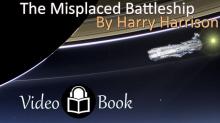 The Misplaced Battleship
The Misplaced Battleship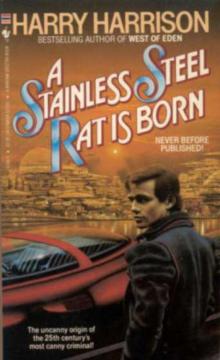 The Stainless Steel Rat is Born
The Stainless Steel Rat is Born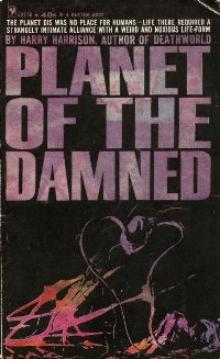 Planet of the Damned bb-1
Planet of the Damned bb-1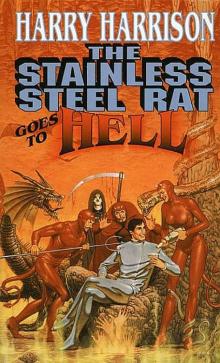 The Stainless Steel Rat Goes to Hell ssr-10
The Stainless Steel Rat Goes to Hell ssr-10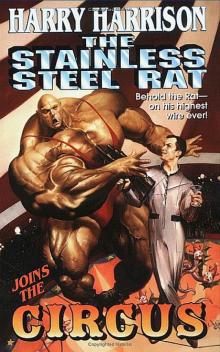 The Stainless Steel Rat Joins the Circus ssr-11
The Stainless Steel Rat Joins the Circus ssr-11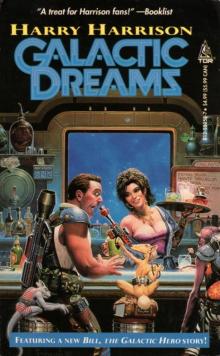 Galactic Dreams
Galactic Dreams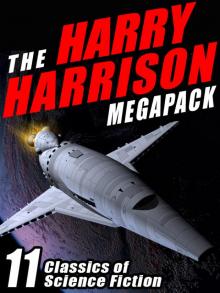 The Harry Harrison Megapack
The Harry Harrison Megapack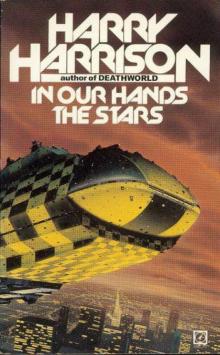 In Our Hands the Stars
In Our Hands the Stars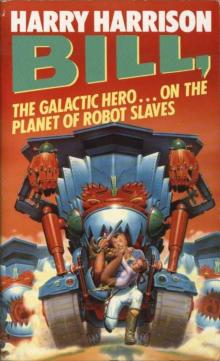 On the Planet of Robot Slaves
On the Planet of Robot Slaves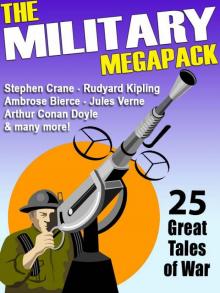 The Military Megapack
The Military Megapack Make Room! Make Room!
Make Room! Make Room!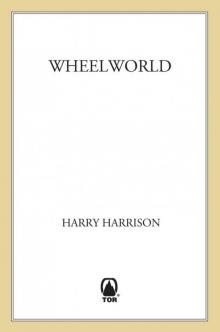 Wheelworld
Wheelworld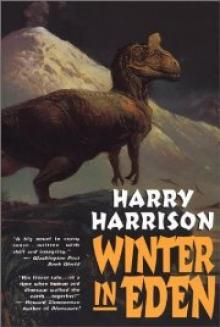 Winter in Eden e-2
Winter in Eden e-2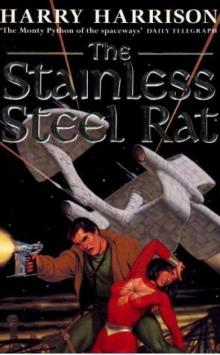 The Stainless Steel Rat
The Stainless Steel Rat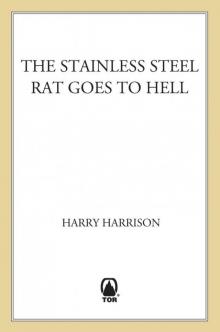 The Stainless Steel Rat Goes to Hell
The Stainless Steel Rat Goes to Hell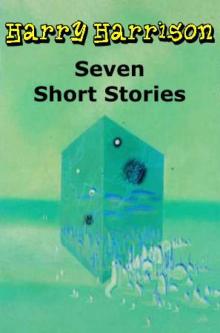 Harry Harrison Short Stoies
Harry Harrison Short Stoies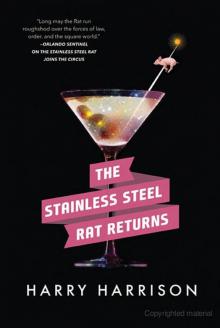 Stainless Steel Rat 11: The Stainless Steel Rat Returns
Stainless Steel Rat 11: The Stainless Steel Rat Returns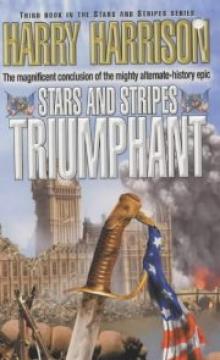 Stars and Stripes Triumphant sas-3
Stars and Stripes Triumphant sas-3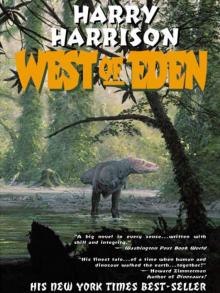 West of Eden
West of Eden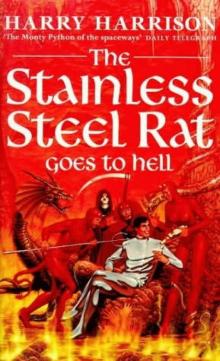 The Stainless Steel Rat Go's To Hell
The Stainless Steel Rat Go's To Hell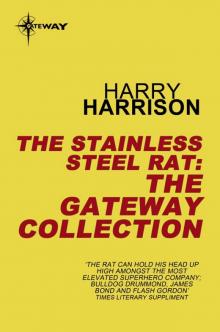 The Stainless Steel Rat eBook Collection
The Stainless Steel Rat eBook Collection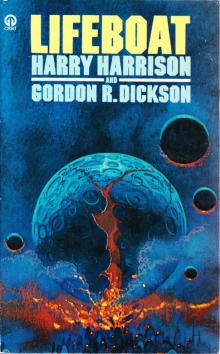 Lifeboat
Lifeboat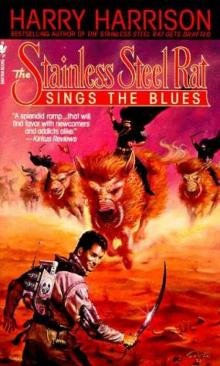 The Stainless Steel Rat Sings the Blues
The Stainless Steel Rat Sings the Blues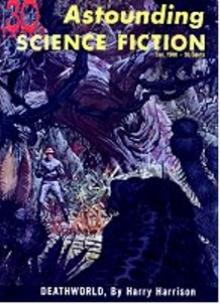 Deathworld tds-1
Deathworld tds-1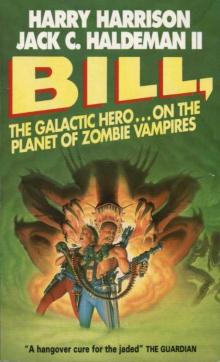 On the Planet of Zombie Vampires
On the Planet of Zombie Vampires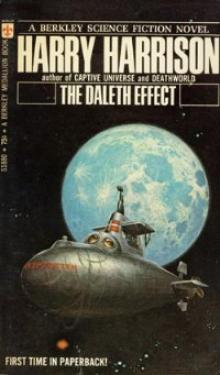 The Daleth Effect
The Daleth Effect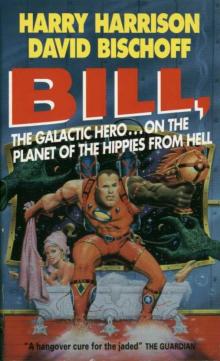 On The Planet Of The Hippies From Hell
On The Planet Of The Hippies From Hell The Turing Option
The Turing Option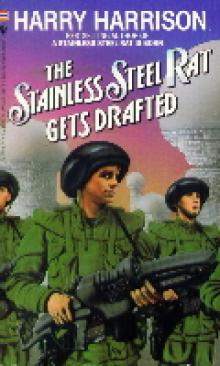 The Stainless Steel Rat Gets Drafted
The Stainless Steel Rat Gets Drafted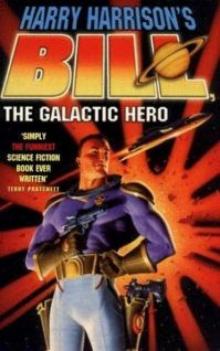 Bill, the Galactic Hero btgh-1
Bill, the Galactic Hero btgh-1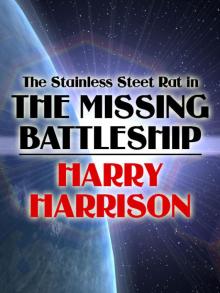 The Stainless Steel Rat in The Missing Battleship
The Stainless Steel Rat in The Missing Battleship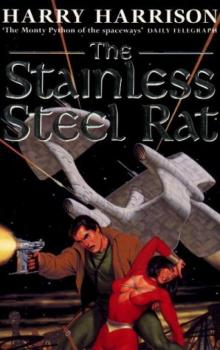 The Stainless Steel Rat ssr-1
The Stainless Steel Rat ssr-1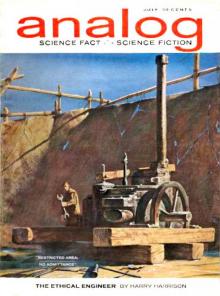 The Ethical Engineer (the deathworld series)
The Ethical Engineer (the deathworld series)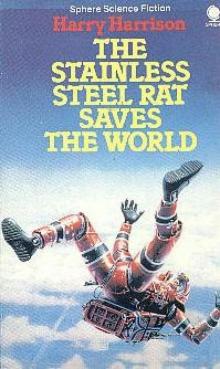 The Stainless Steel Rat Saves the World ssr-3
The Stainless Steel Rat Saves the World ssr-3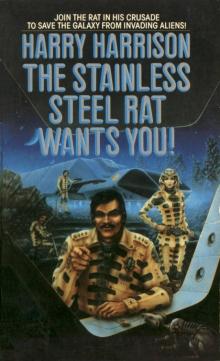 The Stainless Steel Rat Wants You
The Stainless Steel Rat Wants You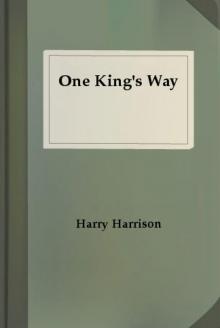 One King's Way thatc-2
One King's Way thatc-2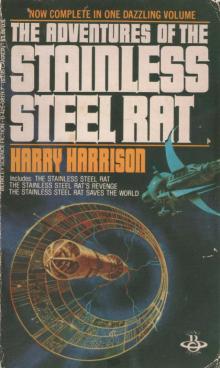 The Stainless Steel Rat Saves The World
The Stainless Steel Rat Saves The World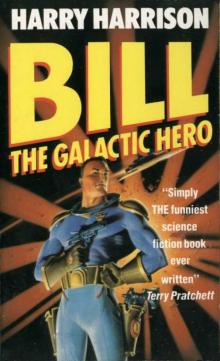 Bill, the Galactic Hero
Bill, the Galactic Hero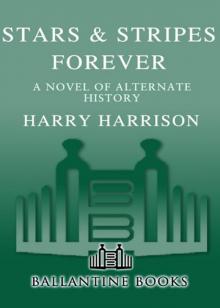 Stars & Stripes Forever
Stars & Stripes Forever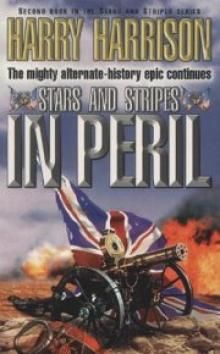 Stars and Stripes In Peril sas-2
Stars and Stripes In Peril sas-2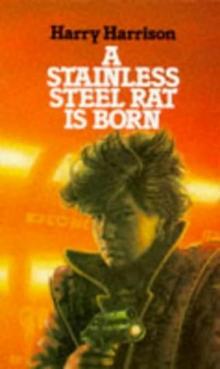 A Stainless Steel Rat Is Born ssr-6
A Stainless Steel Rat Is Born ssr-6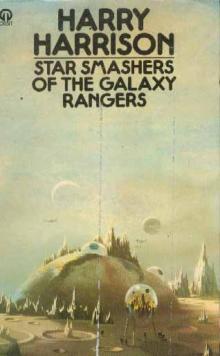 Star Smashers of the Galaxy Rangers
Star Smashers of the Galaxy Rangers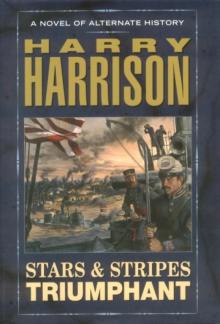 Stars & Stripes Triumphant
Stars & Stripes Triumphant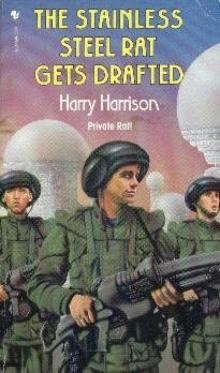 The Stainless Steel Rat Gets Drafted ssr-7
The Stainless Steel Rat Gets Drafted ssr-7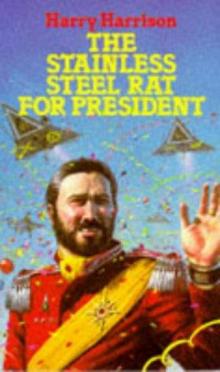 The Stainless Steel Rat for President ssr-5
The Stainless Steel Rat for President ssr-5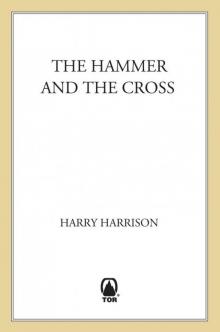 The Hammer & the Cross
The Hammer & the Cross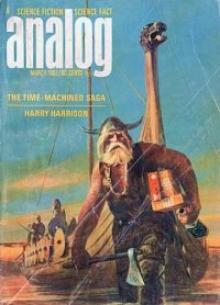 The Technicolor Time Machine
The Technicolor Time Machine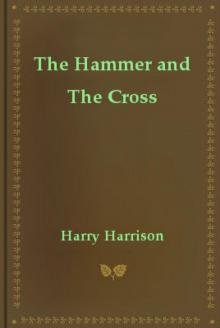 The Hammer and The Cross thatc-1
The Hammer and The Cross thatc-1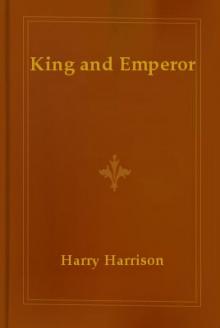 King and Emperor thatc-3
King and Emperor thatc-3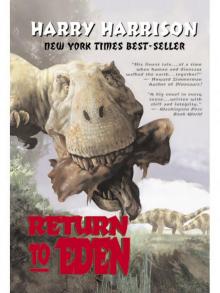 Return to Eden
Return to Eden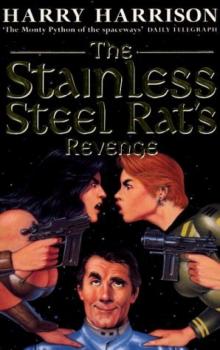 The Stainless Steel Rat’s Revenge ssr-2
The Stainless Steel Rat’s Revenge ssr-2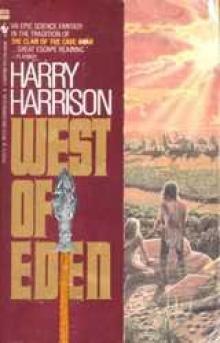 West of Eden e-1
West of Eden e-1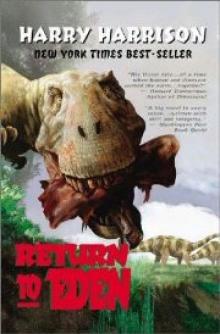 Return to Eden e-3
Return to Eden e-3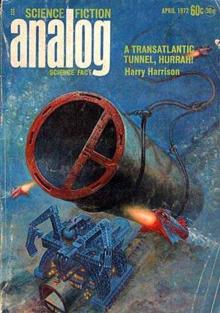 A Transatlantic Tunnel, Hurrah!
A Transatlantic Tunnel, Hurrah!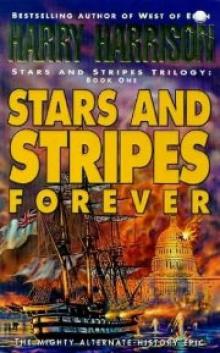 Stars and Stripes Forever sas-1
Stars and Stripes Forever sas-1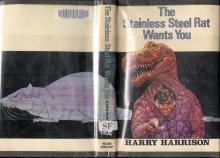 The Stainless Steel Rat Wants You ssr-4
The Stainless Steel Rat Wants You ssr-4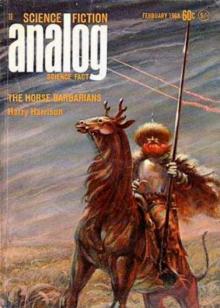 The Horse Barbarians tds-3
The Horse Barbarians tds-3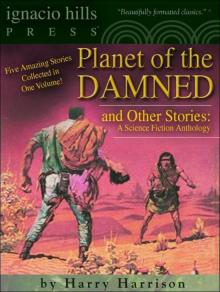 Planet of the Damned and Other Stories: A Science Fiction Anthology (Five Books in One Volume!)
Planet of the Damned and Other Stories: A Science Fiction Anthology (Five Books in One Volume!)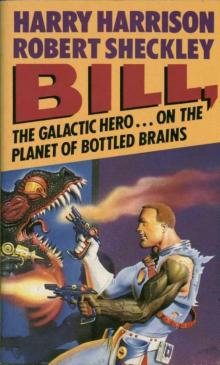 On the Planet of Bottled Brains
On the Planet of Bottled Brains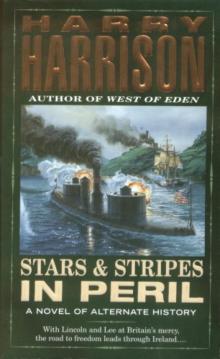 Stars And Stripes In Peril
Stars And Stripes In Peril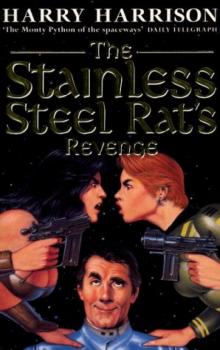 The Stainless Steel Rat's Revenge
The Stainless Steel Rat's Revenge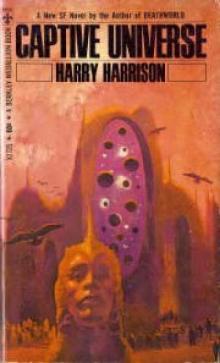 Captive Universe
Captive Universe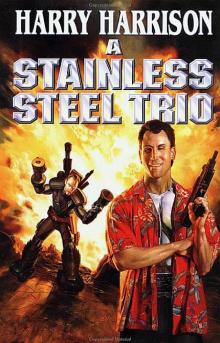 The Stainless Steell Rat Sings the Blues ssr-8
The Stainless Steell Rat Sings the Blues ssr-8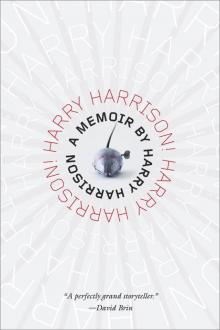 Harry Harrison! Harry Harrison!
Harry Harrison! Harry Harrison!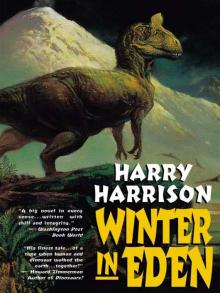 Winter in Eden
Winter in Eden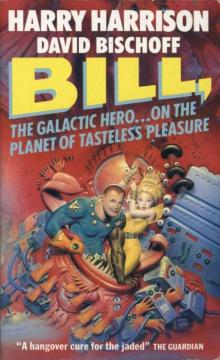 On the Planet of Tasteless Pleasures
On the Planet of Tasteless Pleasures